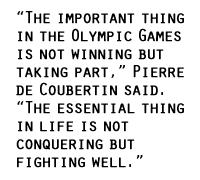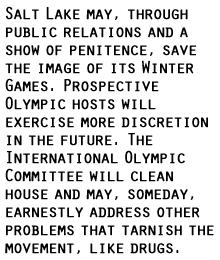Feedback
E-mail the author or send us feedback.
|
Blast @ explode.com is an online magazine presented by Exploding Can Productions, a digital media and Internet company.
Copyright © 1995-1998 Exploding Can Productions. All Rights Reserved. No part of this Web site may be used without permission. To report any problems or if you have any questions, please write to webmaster@explode.com or feedback@explode.com. For advertising, please contact advertise@explode.com.
home | about blast | who we are | editors' note | feedback | sitemap | press | user feedback | links |

By MATT JOHANSON As it grows from snowball to avalanche proportions, Salt Lake City's Olympic bribery scandal is burying American and international officials implicated in the corruption and freezing the spending impulses of corporate sponsors who suddenly question whether those Olympic rings are still worth their $50 million price tag. Why? Do corporations fear that Salt Lake's spending impulses have tarnished the "Olympic spirit?" Have any officials acted in a manner contrary to Olympic custom? Many celebrated Olympians have won success and fame by behaving in a similar fashion. Money and winning were dominant themes of the ancient games in Greece. Winners received generous purses and were excused from taxes for the rest of their lives, and victory was an obsession. Consider the example of Arrachion, a competitor in pancratian (a combination of boxing and wrestling). He won his final match as he twisted his opponent's foot out of its socket. But Arrachion died of internal injuries even as his opponent surrendered, and received his victory wreath while laying dead on the stadium floor.
But Pierre de Coubertin, the Frenchman who revived the Games a century ago, saw a different Olympic vision. "The important thing in the Olympic Games is not winning but taking part," de Coubertin said. "The essential thing in life is not conquering but fighting well." De Coubertin's message was published in English in Athens' Olympic Stadium during the 1896 Games. Maybe no one read it; most of the fans were Greek. If this was the standard, a host of competitors who gave their all but didn't necessarily win would be the greatest Olympic heroes. Distance runners Pattisue Plummer and Steve Prefontaine are two of my favorites. More people would know the name of Phillip Boit, Kenya's first-ever entry into the Winter Games, who took last place in Nagano's 10,000-meter cross country skiing race. Ice skater Nancy Kerrigan would be remembered for her stellar, silver-medal performance in Lillehammer instead of her unfortunate rendezvous with a hit-man's crowbar.
De Coubertin's message also seems to imply that more ethical behavior on the part of Olympics officials would be desirable. But those who control the Olympics apparently believe in the first "Olympic spirit," so it's unreasonable to expect any meaningful change, though they may placate their sponsors. Salt Lake may, through public relations and a show of penitence, save the image of its Winter Games. Prospective Olympic hosts will exercise more discretion in the future. The International Olympic Committee will clean house and may, someday, earnestly address other problems that tarnish the movement, like drugs. But if they fall short of your expectations, or if you tire of the idea that second place is the first loser, then look for the Olympic spirit closer to home in the athletes around you. The true Olympic spirit is where you find it every day.
|
 Many others, like gymnast Kerri Strug, would risk injury and ruin in
pursuit of Olympic victory. Some Olympians, like sprinter Wilma Rudolph,
would overcome incredible adversity and handicaps, but the public
remembers them primarily because they won. Those who value such victories
define the
"Olympic spirit" as the idea that winning is the most important thing in
the world, especially when the Olympics are concerned. If so, then the
bribery allegations surrounding the Salt Lake Winter Games, and rapidly
spreading to the Nagano and Sydney Olympics, do not appear inconsistent
with the movement.
Many others, like gymnast Kerri Strug, would risk injury and ruin in
pursuit of Olympic victory. Some Olympians, like sprinter Wilma Rudolph,
would overcome incredible adversity and handicaps, but the public
remembers them primarily because they won. Those who value such victories
define the
"Olympic spirit" as the idea that winning is the most important thing in
the world, especially when the Olympics are concerned. If so, then the
bribery allegations surrounding the Salt Lake Winter Games, and rapidly
spreading to the Nagano and Sydney Olympics, do not appear inconsistent
with the movement.
 The list extends indefinitely and is not confined to Olympians. Would not
de Coubertin agree that balancing athletic pursuits with other life
interests is a more healthy and laudable attitude than winning at all
costs? If so, then the college student trying to play ball and hold a
job, or the high school kid trying to run a 5-minute mile and earn a B
average, would be more Olympic than many Olympians. How many kids, or
adults, like that do you know?
The list extends indefinitely and is not confined to Olympians. Would not
de Coubertin agree that balancing athletic pursuits with other life
interests is a more healthy and laudable attitude than winning at all
costs? If so, then the college student trying to play ball and hold a
job, or the high school kid trying to run a 5-minute mile and earn a B
average, would be more Olympic than many Olympians. How many kids, or
adults, like that do you know?